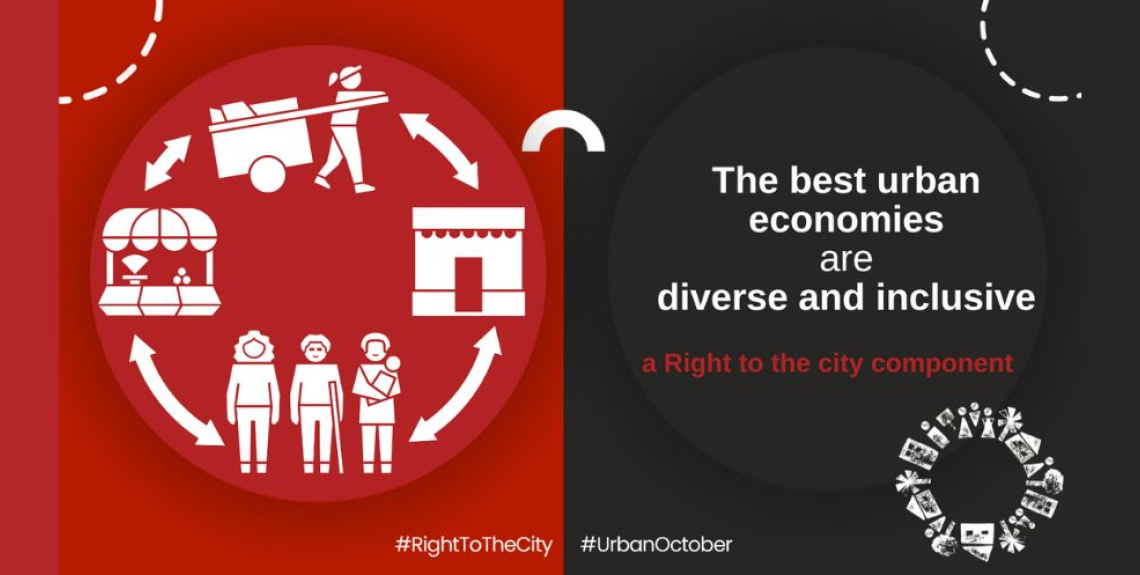As part of the «Human Rights 75» initiative to commemorate the 75th anniversary of the Universal Declaration, our Committee interviews the Global Platform for the Right to the City (GPR2C) on its work to promote human rights in business, the monthly themathic spotlight of October as defined by the Office of the United Nations High Commissioner for Human Rights. Especially since, on the occasion of Urban October 2023, the GPR2C calls for the promotion and support of diverse and inclusive economies, a pillar component of the Right to the City.
Why promote human rights in business at the local level?
The promotion and protection of human rights should be a structuring transversal element in the actions of all actors, whether public, private companies or civil society organisations. However, the way in which the current capitalist system is structured, there is a concentration of power in the hands of a few companies, many acting transnationally, which leads to scenarios of corporate capture in decision-making bodies and a lack of transparency and accountability when they commit human rights violations.
These violations can range from violations of the rights of their workers or the socio-environmental impact of their activities, for example in the case of direct or indirect forced displacement as a result of economic activity. In this sense, we support the effort underway for the approval of a binding international treaty on transnational corporations and human rights.
On the other hand, we believe that the local level provides many opportunities for the development of alternative economic models, within the framework of the social and solidarity economy, care and popular economy, which offer ways to reduce socio-economic and territorial inequalities and to deepen democracy.
Can you tell us about the work of the GPR2C to promote human rights in business at the local level?
On the occasion of Urban October 2023, the GPR2C calls for the promotion and support of diverse and inclusive economies, a component of the Right to the City, to achieve just, inclusive, safe and sustainable cities, towns and human settlements, defined as essential common goods for a full and decent life.
The conjunction of multiple crises, including the environmental/climate emergency and the deepening socio-economic inequalities between and within countries, deepened by the combined effects of the COVID-19 pandemic, makes evident the need for a paradigm shift, particularly in terms of models of production, consumption and decision-making, towards economic models and systems founded on a rights-based solidarity approach, which enhance the social and economic function of the commons, putting the care of people and the planet at the centre.
Thus, on the occasion of the World Day for the Right to the City (31 October), we will launch the collective document «Cities and human settlements with diverse and inclusive economies» to make visible alternative systems that guarantee decent livelihoods and work for all and contribute to the strengthening of community ties and care for the environment.
This document aims to make visible the Right to the City approach to diverse and inclusive economies, to achieve just, inclusive, safe and sustainable cities, towns and human settlements, defined as essential common goods for a full and decent life.
The paper outlines some of the main pillars of diverse and inclusive economies within the Right to the City framework, their inclusion and linkage to international agreements and agendas, and presents a set of enabling actions that can be taken at the local level to promote and advance diverse and inclusive economies, and support those who advance them.
It has been jointly produced thanks to PGDC members RIPESS, Streetnet, WIEGO and Urgenci.
To what kind of international cooperation does the GPR2C aspire for a better promotion of human rights in business at the local level?
We believe that international bodies related to the protection of human rights are fundamental to ensure transparency and accountability of private actors, especially when they act transnationally. In this regard, we would cite initiatives such as the aforementioned binding treaty on transnational corporations and human rights, as well as the work of the UN Special Rapporteurs on Human Rights.
Beyond that, we also believe that networks and instances of collaboration and exchange at the international level are key to strengthening actors operating at different scales in the promotion of alternative economic models based on the promotion of human rights. In this sense, we welcome with enthusiasm the resolution adopted by the UN General Assembly this year on the social and solidarity economy and hope that it will help to open the way for concrete actions and incentives for these types of economies at multiple levels.
Finally, we believe that international spaces that span the global and local levels are also fundamental, incorporating other actors beyond the national sphere. In this sense, we are very excited about the updating process of the UCLG Charter-Agenda on Human Rights in the City, linking with the recognition and promotion of diverse and inclusive economies, as well as the promotion of decent work at the local level.


